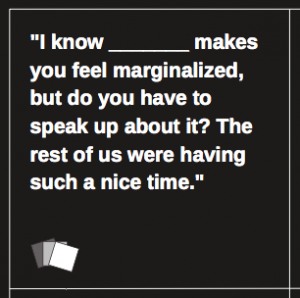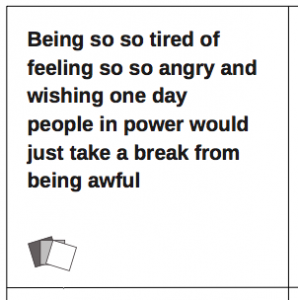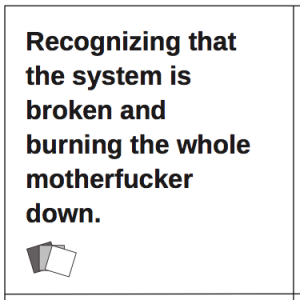 I've been sitting on this post for a little while as I sorted through my thoughts about humour that brands itself as offensive, especially after reading this piece on Daily Dot.
I've been sitting on this post for a little while as I sorted through my thoughts about humour that brands itself as offensive, especially after reading this piece on Daily Dot.
I am regularly called an uptight bitch, a humourless feminist killjoy, overly sensitive, etc etc etc because I don't find jokes that punch down to be funny, and ok, fine, whatever, I can live with that. I don't watch South Park. I don't laugh at Family Guy. I find poop jokes boring and always have. I don't watch stand up comedy, or most sitcoms.
But I do play Cards Against Humanity. And it's something I have sat uncomfortably with, often, as I consider it definitely a Problematic Thing that I like. I don't think I'm a horrible person, but I think that CAH has taught me how much of an influence humour that punches down has on groups of otherwise pretty social justice-y, politically conscious folks. And it's certainly taught me how little people like being told their sense of humour is both lazy and cruel.
There's a number of people who no longer play the game (and understandably so) because there's a lot of cards that require racism, sexism, homophobia, transphobia, ableism, etc for the "punchline". It annoys me that there's a belief that these jokes don't have a wider cultural impact, or are not a reflection of problematic power structures.
Look, I hate to be the bearer of bad news, but no, Cards Against Humanity does NOT make fun of people equally. In order to illustrate the point, I wanted to give you a general count of cards that are pretty explicitly about people with privilege (white, wealthy, straight) vs marginalized people (POC, people with disabilities/chronic illness, rape victims, fat folks, poor folks, queer folks).
I have 848 white cards or so. I counted these being somewhat generous to the game, as some really do depend on context to punch down. These ones do not.
Out of that, there were about 21 punch up by explicitly mentioning privileged people (and that's a mixture of all references to white people, wealth, being straight).
There were 43 where the punchline was about race. 3 about Jewish people, 3 about Hispanic people, 4 about Middle Eastern people, 4 about Native Americans, 7 about Asian people, and *16* about Black people.
There were 11 about rape. There were 16 making fun of people with disabilities, STIS, or chronic illness. There were 9 using LGBT people as punchlines, with 3 being specifically about gender. 5 were about insulting fat people. 5 joke about classism. And I didn't count the "chunks of a dead prostitute" card as I burned it.
That means that ultimately while there's 21 cards that seek to punch up, there's 90 that actively and gleefully punch down.
Arthur Chu addresses this in a piece for the Daily Beast-
 "Every time I play “Surprise sex” as a punchline in Cards Against Humanity I have no way of actually knowing why anyone in particular is laughing. I have no way of knowing if I’m making a rape joke with an actual rapist. But if I play enough pickup games of Cards Against Humanity, someday eventually I will. Hell, even if I only ever play with close friends that I trust, that’s no guarantee—I really, really don’t want to think any of my friends are rapists, but how would I know?
"Every time I play “Surprise sex” as a punchline in Cards Against Humanity I have no way of actually knowing why anyone in particular is laughing. I have no way of knowing if I’m making a rape joke with an actual rapist. But if I play enough pickup games of Cards Against Humanity, someday eventually I will. Hell, even if I only ever play with close friends that I trust, that’s no guarantee—I really, really don’t want to think any of my friends are rapists, but how would I know?
Just like I want to believe that we’re all laughing at jokes about “black people” or “The Third World” purely because they’re horrible and not because some tiny part of us enjoys the schadenfreude of being able to make the joke and not be the one joked about. I want to believe games that devolve into crudely insulting each other based on our sore spots are truly meant “in fun” and not a socially approved way to get away with bullying. I want to believe everyone’s motives are pure, even though I honestly don’t even know that about my own motives.
I want to believe that I can have absolute confidence that neither I nor any other people around me are horrible. Cards Against Humanity is built on that wishful thinking."
I absolutely agree with this. I think it's vital to remember that humour does actually have an impact in how we respond to real life situations. There is no such thing as "just a joke", especially when that joke depends on stereotypes. I'm constantly referring to this study by Thomas E. Ford and Mark A. Ferguson, on the social consequences of disparagement humour. Here's a part of the conclusion:
"By making light of the expression of prejudice, disparagement humor communicates a message of tacit approval or tolerance of discrimination against members of the targeted group. Our theory proposes that the recipient must accept the disparagement humor for a shared norm of tolerance of discrimination to actually emerge. Furthermore, our research suggests that people high in prejudice are more likely to accept disparagement humor and thus perceive a norm of tolerance of discrimination in the immediate context. Finally, people high in prejudice are likely to use the activated normative standard as a source of self-regulation, or a guide for interpreting discriminatory events encountered in that context."
But that's not all. There's also people who don't play because of Max's rape accusation and following behaviour, and that also really needs to be addressed.
 Max Temkin, the game's creator, was accused of rape and dealt with it pretty poorly- he deserves to be held accountable for that. I absolutely support that accusation and his response having real life consequences, as it did when he ended up not appearing at XOXO.
Max Temkin, the game's creator, was accused of rape and dealt with it pretty poorly- he deserves to be held accountable for that. I absolutely support that accusation and his response having real life consequences, as it did when he ended up not appearing at XOXO.
Culturally we have taught people there are two ways to deal with accusations- ignoring it or total ostracization, which hasn't made people any safer, at least in my experience with the BDSM community and Consent Culture. I think ongoing education and actions to demonstrate what you've learned while not silencing the initial accusation in any way, but rather using it to check in with yourself and reflect, is more effective.
Can I be brutally honest? Most people you and I know have violated consent in their lives. You have probably done it. I have, I've even written about it. That absolutely doesn't mean that it's ok, or something to be ignored, but I also think that if you really think you can 100% avoid being complicit with rape culture more power to you because you must be a goddamned saint. It's about confronting abusive behaviours, yes, but it's also about how you deal with being held accountable for your fuckups.
What accountability would I like to see? I think apologizing is a good start, and not in a "sorry you feel that way" sort of way. I think he still needs to write a piece that indicates his understanding of how rare false rape accusations are, that college nonconsent stats are incredibly high and that college aged men don't always identify rape as rape because the interaction wasn't violent. I think he needs to call out people reposting his statement as proof women are lying bitches. I think vulnerability is required, not defensiveness.
I feel very strongly that nonconsent is a massive, ongoing, difficult to get a hold of issue that requires multiple responses- including, but not exclusively, banishment. Fundamentally, above all, I believe in holding people accountable. I think shutting down conversation has not helped people who were raped in BDSM community, but ongoing discussion HAS created a better dialogue about the issue. And I think that as aggravating as it is sometimes, internet activism has been pretty damn good at holding people accountable and raising awareness at how widespread of an issue this is.
I appreciate what Patricia Hernandez said on Kotaku:
"Consent is not about being perfect, not to me at least. Yes, consent teaches you the importance of asking for permission and making sure you don't cross any boundaries, but it also teaches you the importance of being honest about where you fall short. Consent exists not just as something that should be used to get the green light for a hook-up, but as a mode of thinking about and processing experiences you've had in the past.
Temkin almost gets there: he presents the idea that maybe the woman read the situation differently than he did. But you have to remember the context is how the accusation is "patently false." It happened a long while ago. He broke up with her. Maybe this hurt her feelings. Maybeshe read it wrong.
Temkin sets an example for the community, but he's not willing to really contemplate the possibility he might've messed up, nor does he do much to further a crucial conversation about consent that everyone should think about. And when Temkin is one of the minds behind a hugely popular game, and has gained profile as "one of the good guys" who supports progressive organizations and people, this is a problem.
I don't expect everyone to get consent right all the time. But having better conversations about consent—and being willing to admit the possibility of past mistakes—would be a start."
It's all so contrary to the behaviour of the game company in other ways. I support their hilarious protests of Black Friday, whether it's sending out actual bullshit, or raising their prices. And yes, they have also *removed* a number of cards from print. After being called out about cards like "date rape", "passable transvestites, and "chunks of a dead prostitute", those cards have been removed. CAH helped fund queer gaming convention GaymerX, who called out Penny Arcade about their "dickwolves" bullshit, and Max has apparently been quietly funding trans women making games (and me, as of this month).
But then, you can have great behaviour in some ways and fucked up in others, right? Because humans are messy.
I was talking to J about this and she proposed that perhaps CAH were trying to work on their ethical carbon footprint. I'm not sure about that, but I feel kind of irritated when marginalized people are being finger-wagged at for taking money from a problematic source because of ethics... that money is helping people make rent and eat food. Unless you're volunteering to take the place of that financial source, I think it's worth considering how we all are complicit in rape culture, patriarchy, capitalism, racism, and many other things. It's a valid critique, sure, but I absolutely will take money to fund consent writing from someone who may have sexually assaulted someone. In fact I wish that was a thing, that people working on consent were funded by people who violated it as a way to help encourage education and more work on the topic rather than survivors always ending up footing the bill. I think that's part of being responsible.
 I also think its possible to play the game with people also interested in punching UP, not down. People tend to say if you took out the offensive cards it'd be 20%, 30%, 50% of the deck. Well, having now gone through and counted, I have to say removing 90 out of 843 does not seem to be that significant. I think you can still manage to have a fun game without actively engaging in bigotry. Yes, I think that CAH should get rid of more of those cards (especially all the ones that are about Black people, are you serious, CAH?), though I've also seen some of them (like the sexist cards) be played intelligently as a way to still punch up.
I also think its possible to play the game with people also interested in punching UP, not down. People tend to say if you took out the offensive cards it'd be 20%, 30%, 50% of the deck. Well, having now gone through and counted, I have to say removing 90 out of 843 does not seem to be that significant. I think you can still manage to have a fun game without actively engaging in bigotry. Yes, I think that CAH should get rid of more of those cards (especially all the ones that are about Black people, are you serious, CAH?), though I've also seen some of them (like the sexist cards) be played intelligently as a way to still punch up.
For me, CAH can provide a vent for my anger at institutionalized oppression, because I play with people who also prioritize that and who are open to being called out if they hurt someone's feelings. Personally, I learn a *lot* about people by how they handle various cards, and yes, I socially pull away from people who find "big black dick" jokes hilarious. I have yet to meet someone who can tell me, a sex worker, a joke using "chunks of a dead prostitute" in a way I laugh at. And I appreciated Max apologizing to me for that card, and acknowledging that between 8 people, it sometimes takes time for compassion and an intersectional awareness to really sink in.
And I think that's really the crux of the matter. If, when people say "this game relies on some fucked up, not funny shit", your response is "CENSORSHIP!!! YOU'LL NEVER TAKE MY RACIST RAPE JOKES!" and not "man, I definitely don't want to hurt someone's feelings, or laugh at an experience of trauma I don't know about, especially when I don't know who might be triggered by what!", you're not pretending to be a horrible person. You ARE a horrible person, and selfish to boot.
It's not hard, or impossible, to make CAH something people can enjoy playing. Isn't that what party games are for? And I think the onus of that is on the creators of the game AND the consumers of it.
Quick reminder that Ladies Against Humanity is a great tumblr, and where I took these various images from. I plan to use some of their suggestions for my blanks!
Categories: activism, ah youth, best of, capitalism, censorship, communication, consent, feminism, games, male privilege, mistakes were made, personal, politics, pop culture, racism, rape culture, sex work is work, snark
Be the first to comment
Post a comment